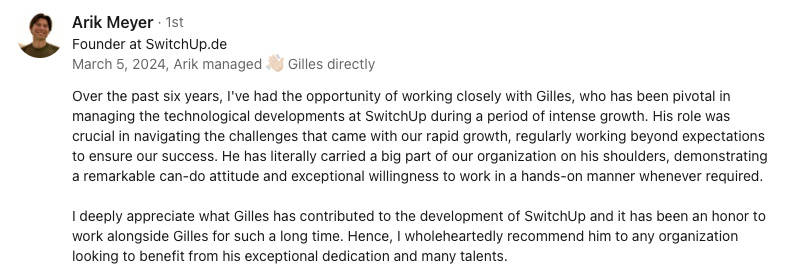Abstract:
The article explores the challenges and opportunities for startups in navigating EU regulations when deploying Wi-Fi 6 technology, which offers faster speeds and improved connectivity. Central to this are the General Data Protection Regulation (GDPR) and the ePrivacy Directive, which mandate stringent data protection and privacy standards that startups must adhere to, including strong encryption and secure authentication. Compliance is not just about avoiding fines but can be a strategic asset, fostering customer trust and attracting investors. To achieve compliance, startups should conduct audits, implement technical measures like WPA3 encryption, and train employees on data protection. Emphasizing compliance as an integral part of innovation, the article suggests that startups can use regulatory constraints to drive creative solutions. It highlights the importance of engaging with industry groups and advisors to stay informed and compliant, thus positioning startups for continuous growth and innovation. The integration of Wi-Fi 6 with IoT is also discussed, emphasizing the scalability and security it offers for future expansions. Ultimately, the article posits that embracing EU regulations can be a strategic advantage, distinguishing startups in a competitive market and turning compliance into a catalyst for success.
Navigating EU regulations can be challenging, especially for startups eager to leverage new technologies such as Wi-Fi 6. This technology promises faster speeds and improved connectivity, but businesses must adhere to regulations that ensure data safety and privacy. Understanding these rules is essential not only for survival but also for thriving in this competitive space.
Understanding EU Regulations
Wi-Fi 6 is becoming a significant component of digital infrastructure, making it crucial to understand the EU rules governing its use. These regulations are designed to protect user privacy and data security.
Key Regulations Shaping Wi-Fi 6 Deployment
Two primary laws impact the use of Wi-Fi 6: the General Data Protection Regulation (GDPR) and the ePrivacy Directive. These laws establish stringent standards for data protection and privacy, especially important for startups. The GDPR mandates that businesses protect personal data, influencing how Wi-Fi 6 networks must manage data without compromising privacy.
The GDPR requires startups to safeguard personal data transmitted over Wi-Fi 6 networks. This means designing networks that meet these standards by integrating robust security measures to prevent legal issues.
The ePrivacy Directive focuses on securing communications. For startups, this means implementing strong encryption to protect data sent over Wi-Fi 6. It ensures communication integrity and restricts access to authorized users, making encryption a crucial part of compliance.
Implications for Wi-Fi 6 Technology
Wi-Fi 6 offers features that must align with EU regulations to protect user data. Features like WPA3 encryption are essential for secure data transmission. Aligning these features with regulations not only shields user data but also helps startups use Wi-Fi 6 without legal complications.
However, using Wi-Fi 6 while adhering to EU rules is not without its challenges. Startups need to carefully plan to balance innovation and compliance. Non-compliance can lead to fines and damage to reputation, highlighting the importance of understanding these regulations.
Practical Strategies for Compliance
Adhering to EU regulations is vital when utilizing Wi-Fi 6. Start with a compliance audit to identify gaps in data protection. Use specialized tools for this purpose, then implement strong technical measures to address these gaps. This audit lays the groundwork for secure Wi-Fi 6 use.
Strong Encryption and Secure Authentication: The backbone of a secure Wi-Fi 6 network is robust encryption and secure authentication. Using WPA3 enhances data protection. Configure networks with advanced encryption and secure authentication methods like Simultaneous Authentication of Equals (SAE) to ensure data is encrypted and access is restricted.
Employee Training: Training employees on EU regulations is as crucial as technical measures. Regular workshops on data protection help employees understand their role in maintaining security. This fosters a culture of compliance, where privacy and security are prioritized.
Optimal Practices for Wi-Fi 6 Networks
Improving security involves network segmentation and isolation to reduce the risks of unauthorized access. Utilizing features like Basic Service Set (BSS) Coloring helps manage interference and protect sensitive data.
Deploying Intrusion Detection and Prevention Systems (IDS/IPS) is crucial. These systems monitor network traffic for threats, allowing startups to respond quickly and maintain compliance.
Regular firmware updates from vendors are key. They fix vulnerabilities and enhance security. Staying on top of these updates protects networks from new threats, ensuring long-term compliance.
Integrating Innovation with Compliance
Balancing the benefits of Wi-Fi 6 with EU regulations is challenging but achievable. Using strategies like Orthogonal Frequency-Division Multiple Access (OFDMA) and Target Wake Time (TWT) can improve performance while meeting compliance standards. TWT, for instance, reduces unnecessary data transmissions, protecting sensitive data.
Successful startups demonstrate that innovation and compliance can coexist. Collaborating with industry groups and legal advisors helps maintain this balance. These partnerships provide insights into best practices and regulatory changes.
Engaging with industry standards groups helps startups stay informed about regulations. This involvement not only aids compliance but also fosters collaboration and drives innovation.
Challenges and Solutions
Balancing new technology with compliance requires a shift in mindset. Viewing compliance as a catalyst for innovation changes how startups approach tech deployment. Using compliance as a design constraint encourages creative solutions within regulatory limits.
Working with legal and tech advisors is crucial. They provide guidance on regulations, ensuring innovative solutions remain compliant. Collaborating with experts helps startups confidently tackle regulatory challenges.
Building Trust Through Compliance
In technology, trust is vital. By adhering to compliance, startups demonstrate their commitment to data protection, building customer trust and loyalty. This proactive stance distinguishes a startup in a crowded market.
Trust as a Strategic Asset
Compliance is not just about ticking boxes. It serves as a market differentiator. Publicly committing to regulations can attract stakeholders who value integrity. Investors view compliant startups as safe bets, making them attractive partners.
Real-world examples show the power of compliance. A startup's alignment with EU rules can solidify its reputation and open funding opportunities, strengthening investor relationships.
Long-Term Benefits
A strategy aligned with regulations offers long-term benefits. It simplifies market entry and builds a positive image, attracting collaborators. A strong compliance record draws partners eager to work with a reliable entity.
Embedding compliance supports sustainable growth. It ensures innovations flourish within regulatory limits, positioning startups for continuous growth and innovation.
Future-Proofing with Wi-Fi 6
Staying ahead of regulations is crucial for startups using Wi-Fi 6. This ensures compliance and prepares for future growth.
Preparing for New Regulations
Keeping an eye on regulations is essential. Monitoring updates helps adapt compliance strategies quickly. Engaging in policy developments offers insights and allows startups to shape policies.
Investing in compliance and certification shows a commitment to meeting regulatory demands. Certifications ensure readiness for future changes, providing a strategic advantage.
Leveraging Wi-Fi 6 for IoT
Wi-Fi 6 opens opportunities for secure IoT deployments. Its security protocols protect IoT devices, ensuring networks are secure and compliant.
Wi-Fi 6 features improve IoT management, enhancing device performance while minimizing security risks. These features help startups manage IoT networks, complying with regulations.
Wi-Fi 6's scalability supports growing IoT networks while maintaining compliance. It allows startups to expand without compromising performance, ensuring sustainable growth.
Embracing EU regulations for Wi-Fi 6 can be a startup's secret weapon. Understanding rules like GDPR helps build trust and innovation. Compliance sets startups apart in a competitive market. By investing in security measures and staying updated on regulations, startups turn challenges into opportunities for success.
You might be interested by these articles:
- Wi-Fi 6: The Future of Enterprise Connectivity
- Wi-Fi 6 Deployment Strategies
- Maximizing Wi-Fi 6 for Business Growth
- Wi-Fi 6 upgrades made easy on a tight budget





